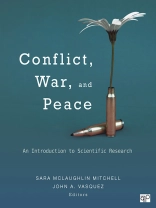Introducing students to the scientific study of peace and war, this exciting new reader provides an overview of important and current scholarship in this dynamic area of study. Focusing on the factors that shape relationships between countries and that make war or peace more likely, this collection of articles by top scholars explores such key topics as dangerous dyads, alliances, territorial disputes, rivalry, arms races, democratic peace, trade, international organizations, territorial peace, and nuclear weapons. Each article is followed by the editors’ commentary: a ‘Major Contributions’ section highlights the article’s theoretical advances and relates each study to the broader literature, while a ‘Methodological Notes’ section carefully walks students through the techniques used in the analysis. Methodological topics include research design, percentages, probabilities, odds ratios, statistical significance, levels of analysis, selection bias, logit, duration models, and game theory models.
قائمة المحتويات
Part I: Overview
1. Introduction – Sara Mc Laughlin Mitchell and John A. Vasquez
2. Dangerous Dyads: Conditions Affecting the Likelihood of Interstate War, 1816-1965 – Stuart A. Bremer
Major Contributions: Dangerous Dyads
Methodological Notes: Probabilities
Part II: Dangerous Dyads
3. Bones of Contention: Comparing Territorial, Maritime, and River Issues – Paul R. Hensel, Sara Mc Laughlin Mitchell, Thomas E. Sowers II, and Clayton L. Thyne
Major Contributions: Territorial Conflict
Methodological Notes: Log Odds, Logit Model, and Substantive Significance
4. Alliances and the Expansion and Escalation of Militarized Interstate Disputes – Brett Ashley Leeds
Major Contributions: Alliances
Methodological Notes: Selection Bias
5. The New Rivalry Dataset: Procedures and Patterns – James P. Klein, Gary Goertz, and Paul F. Diehl
Major Contributions: Rivalry
Methodological Notes: Percentages, Reliability, and Validity
6. The Outcomes of Military Buildups: Minor States vs. Major Powers – Susan G. Sample
Major Contributions: Arms Races
Methodological Notes: Statistical Significance and Control Variables
7. Assessing the Steps to War – Paul D. Senese and John A. Vasquez
Major Contributions: The Steps to War
Methodological Notes: Research Design and Measurement
8. Rivalry and Diversionary Uses of Force – Sara Mc Laughlin Mitchell and Brandon C. Prins
Major Contributions: Diversionary Theory
Methodological Notes: Interaction Terms and the GEE Model
Part III: Peaceful Dyads
9. The Kantian Peace: The Pacific Benefits of Democracy, Interdependence, and International Organizations, 1885-1992 – John R. Oneal and Bruce Russett
Major Contributions: Democratic Peace
Methodological Notes: Levels of Analysis
10. Economic Interdependence: A Path to Peace or a Source of Interstate Conflict? – Katherine Barbieri
Major Contributions: Economic Interdependence
Methodological Notes: Missing Data
11. A Unified Statistical Model of Conflict Onset and Escalation – William Reed
Major Contributions: Power Preponderance
Methodological Notes: Selection (Censored Probit) Models
12. Bordering on Peace: Democracy, Territorial Issues, and Conflict – Douglas M. Gibler
Major Contributions: Territorial Peace
Methodological Notes: Spurious Relationships
13. Proliferation and International Crisis Behavior – Victor Asal and Kyle Beardsley
Major Contributions: Nuclear Weapons
Methodological Notes: Ordered Logit Models
Part IV: Outcomes & Consequences of War
14. The Precarious Nature of Peace: Resolving the Issues, Enforcing the Settlement, and Renegotiating the Terms – Suzanne Werner
Major Contributions: Enforcing Settlements
Methodological Notes: Duration (Weibull) Models
15. War and the Survival of Political Leaders: A Comparative Study of Regime Types and Political Accountability – Bruce Bueno de Mesquita and Randolph M. Siverson
Major Contributions: Leader Survival
Methodological Notes: Game Theory Models
عن المؤلف
John A. Vasquez is the Thomas B. Mackie Scholar in International Relations at the University of Illinois at Urbana-Champaign. The author of The War Puzzle Revisited (2009), he has served as president of the Peace Science Society (International) and the International Studies Association.












